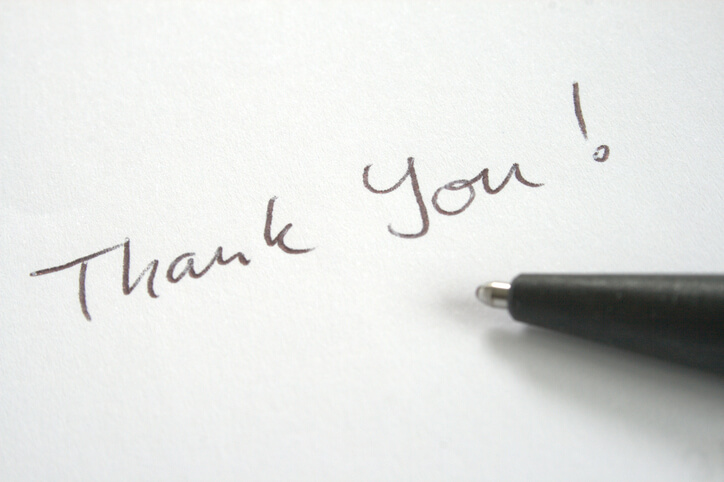You might have aced the job interview, but did you know that a timely, thoughtful follow-up will make all the difference? Or even if you weren’t in top form during that all important interview session – how can you turn things around after walking out the door?
Here are some tips to up your job hunt ‘A’ game even after the interview.
1. Say “thank you”
On top of keeping yourself at the top of your potential boss’ mind, the importance of a follow-up ‘thank you’ note also conveys your appreciation for your interviewer’s time. Hiring managers often have to meet dozens of candidates a day, and this can be very exhausting. Besides a verbal thank you after the interview, sending the interviewer a personal note further conveys your sincerity and thoughtfulness. Moreover, this study by Career Builder states that one in five hiring managers are less likely to hire a candidate who didn’t send a thank-you note. Not sure how to phrase a thank you note? Just remember to include these three things:
- Your interest in the position – because what other reason is there for your application for the job?
- What makes you stand out from the other applicants – ideally this should have been communicated during the interview session, but you could mention a follow-up to what you’ve related. It could be a side project that you did, which was not mentioned in your résumé, or something interesting that happened in your previous workplace that you think demonstrated your skills for this current job.
- What you have learnt from the interview – whether it is something interesting about the job scope that you never knew, or an interesting fact about the industry, be sure to reiterate any small nugget of new information you have gleaned from the interview. You might like to supplement that fun fact with added research. This shows that you were paying attention, and demonstrates curiosity and diligence, qualities that are valued in any industry.

2. Get to the point
The thing about using follow-up email templates is that while they cover most of the necessary points, it is often over-elaborated in separate paragraphs. Having a letter going beyond three paragraphs doesn’t exactly demonstrate effective communication, and what bosses usually lack is time. Keep your note short, sweet, and succinct. Your job is to make your letter sound natural and sincere as possible. Refrain from mechanical rhetoric, instead make sure you sound genuine and get straight to the point.
via GIPHY
3. Perfect timing
If you’ve followed all the above tips, then all that is left is to schedule your follow-up note well.
Generally, following up a day after the interview shows that you remember what your interviewer said, and are vigilant without being too pushy. This way your message can truly be effective – you should come across as giving a professional nudge rather than sending out a rude or desperate call.
And while waiting to hear back from your interviewer can be nerve racking, it’s important to always maintain a positive and friendly tone. Remember that the interviewer is not obliged to get back to you if they don’t intend on hiring you, but it’s important to thank them anyway, build connections, and establish your reputation as a respectful applicant. A little bit of kindness does pay off in the long run!









